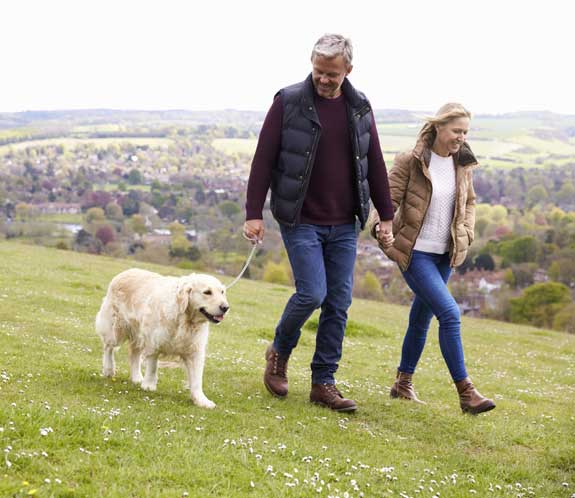A Brief Guide to Adopting a Senior Dog

Are you considering adopting a senior dog? Do you feel as if you're navigating uncharted territory? You're not alone.
Our obsession with puppies is entirely understandable. After all, who can resist those tiny paws, soft patches of baby fur, and big, mesmerizing eyes? Our instinct to be drawn towards babies of any species likely explains why most pet parents opt for puppies or younger dogs.
Unfortunately, there are many older dogs in need of homes. When looking for companionship, it can be easy to overlook a senior dog and gravitate towards a fresh-faced puppy who is likely to live another 10-15 years.
In this feature, we will be looking at some of the advantages and challenges of creating a new home for senior dogs and what you need to consider, should the thought of adopting older dogs cross your mind.
Let's get started.
SENIOR DOGS: HOW OLD ARE THEY?
While technically undefined and unspecified, "senior" dogs are usually 8 years or older for larger breeds and 11 years or older for smaller breeds. However, some larger breeds, such as Great Danes, are considered seniors at 6 years old!
THE ADVANTAGES OF ADOPTION SENIOR DOGS
An Instant Overview: When adopting a senior dog from a shelter, you might already have had the opportunity to learn almost everything about the dog you are welcoming into your home. Knowing a lot about the dog you are adopting can help you out in the long run, especially in terms of medical history, nutritional, and behavioral requirements. Their behavior can often be more predictable because individual dog personalities are usually developed by that age.
It also helps to know that whenever you adopt a senior dog, there is always a good chance of your prospective dog having pre-existing conditions. When it comes to training and behavior, some dogs may have well-established training while others may have none at all. It's important to remember that many shelter dogs haven't had any previous owners, so you may be starting from scratch. But don't let that intimidate you. Old dogs CAN learn new tricks!
You Become Part of An Experienced Dog's Life: When you adopt a senior dog, you essentially rescue them from a prison-like environment and welcome them into a new, cozy home. Most dogs are left in shelters without ever having the experience of finding a deserving owner. There are also cases wherein dogs found in shelters have experience of being in abusive homes. Your new dog may seem scared, frightened, or anxious at first. Be sure to show your dog where he or she will sleep, their food and water area, and where they will be able to use the restroom. As your dog gets used to his new surroundings, he should calm down and warm up to his new environment. Just give him or her some time. When considering owning a senior dog, it helps to know certain breeds and their temperaments to see if you and your pooch will co-exist peacefully.
Becoming a pet parent to a dog in their senior years requires patience, time, and a lot of love. While older dogs may not have as much energy or spunk as young puppies, don't let that stop you from encouraging your dog to play, fetch, and exercise. Start a tradition of a daily walk to help facilitate the new relationship. Your dog may resist at first, but over time he will grow to enjoy and look forward to his time with you. If you've adopted a dog that's been in the shelter for a long time, he may be skittish or frightened at first being in new surroundings or new public spaces. If you notice this behavior, start slow and have patience with your dog. Let him know that it's okay. If the nervous behavior continues, go home and try again the next day. As I said, having a senior pet requires patience, time, and a lot of love.

THE CHALLENGES OF ADOPTING SENIOR DOGS
Pre-existing Health Conditions: Probably the most common case for senior dogs; with all their time spent with previous owners, there's always that possibility of old dogs having the aforementioned conditions and ailments. They can also have a fairly hard time keeping up with the energy and vibe of children in the household and can appear to be restless during specific situations. When considering adopting a senior dog, it helps to be sure that you will be willing to cater to their potential needs, should the situation ask for it.
Time Is of the Essence: Just like any other loving pet parent, you're going to want to spend as much time as you can with your dog. With senior dogs, though not always the case, the life expectancy can be deemed low. If the dog still exercises and has an active lifestyle, chances are he or she will live longer than expected. However, that all depends on your pet's previous home environment, overall health, etc.
SOME TIPS ON ADOPTING AN ADULT DOG
For starters, you're going to want to make sure that your dog will fit your personality, lifestyle, and commitment. Though some older dogs can certainly be low maintenance, older dogs still have their needs. Next, make sure you do your research on your chosen dog's medical records and requirements so that you will be able to provide for their needs when the time comes. You should always ask the shelter or previous owner for as much information as possible, should the situation allow it. Lastly, cherish every moment you have your dog.
While bringing home an older dog will always have its challenges, welcoming a new dog into the family is still a joyous event. We hope that this guide helped you decide whether or not you want to adopt an older dog.
Ready to start searching? We've partnered with Adopt-a-pet.com to help potential pet parents find the right dog or cat for them! Click HERE to get started!
Previous article

Next article

Related posts
View all-

5 Simple Tips to Make Sure Your Cat Drinks Enough Water
Ensuring your cat stays hydrated is important, but it can be challenging since many cats don't drink enough water. Dehydration can lead to kidney disease and other health issues. Fortunately, you can encourage your cat to drink more with a few simple changes. Read Article -

How to Keep Your Cat Busy at Night (So You Can Sleep)
For many cat owners, the quest for a good night's sleep while keeping their feline friends content and engaged can seem like a never-ending battle. Cats, naturally more active at night or early in the morning, often disrupt your sleep schedules with nocturnal activity, whether through playful nature or seeking attention. Read Article -

Should You Bathe Your Cat? Everything You Need to Know About Cat Hygiene
When it comes to cat hygiene, a common question among cat owners is, "Should you bathe your cat?" Understanding how to care for felines, especially bathing cats properly, is crucial for maintaining their overall health. Most cats are fastidious groomers, but specific scenarios like long-haired cats getting dirty or skin irritations, might require a bath.
Read Article



